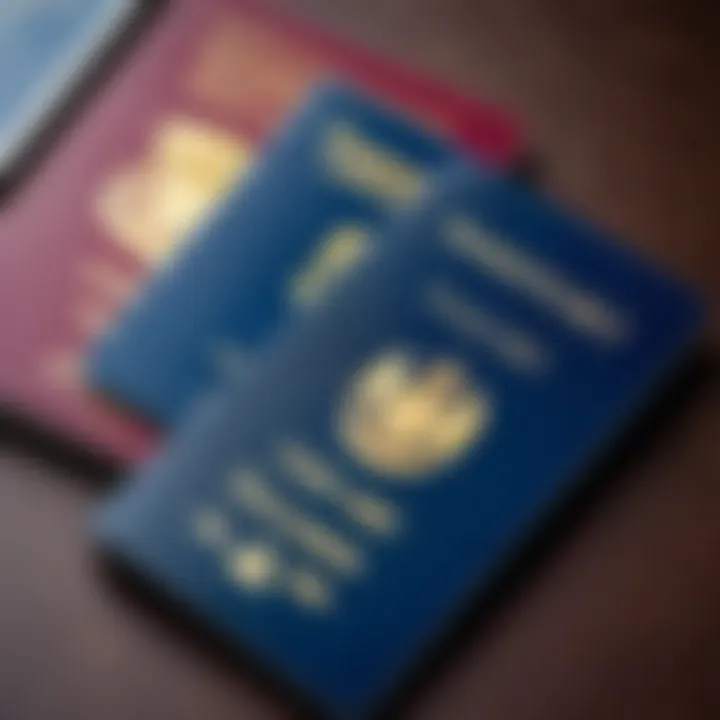Understanding the Key Differences Between Visa and Passport


Intro
Traveling is a vast world of exploration and opportunity. Yet, for those venturing beyond their homeland, two documents emerge as essential for crossing borders: the visa and the passport. Many people often confuse these two, believing them to be interchangeable. However, understanding their distinct functions, purposes, and requirements is vital for a smooth travel experience.
A passport serves as an individual's identity document for international travel, verifying nationality and identity. It is typically issued by a government and is essential to enter foreign countries. In contrast, a visa is granted permission by a specific country allowing the holder to enter, stay, or leave according to the conditions set by that nation.
In this discussion, we will define both of these critical travel documents. We will also cover their purposes, types, application processes, and the interplay that governs their use. By delving into these aspects, travelers can gain a better understanding of how to navigate the complexities of global mobility.
Popular Destinations
Unique destinations for exotic travels
When considering travel, many people dream about unique and exotic locations. Countries like Thailand, Morocco, or Brazil offer rich cultures and breathtaking landscapes. However, before packing your bags, understanding the entry requirements for these nations is crucial. For most, a passport is the primary necessity, while others might require a visa.
Comfortable places for family vacations
Traveling with family can be rewarding and memorable. Popular family-friendly destinations include Italy, Canada, and Australia. These locations not only provide various activities for all age groups but often have straightforward visa procedures, making travel planning easier. Understanding the visa requirements, especially for minors, helps ensure that families can enjoy their trips without unexpected hurdles.
Preparing for Travel
Tips for Choosing a Route
When planning a trip, it is important to consider the best route to your destination. Research available flights and ground transportation options. Look for airfares that fit your budget but also provide the best experience in terms of comfort and convenience. Always check entry requirements for countries you may have layovers in, as some might require transit visas.
How to Pack a Suitcase: Useful Tips
The packing process is not just about fitting clothes into a suitcase. Here are some useful tips:
- Check the weather: This influences what clothes to bring.
- Roll clothes: This saves space and reduces wrinkles.
- Use packing cubes: These organize items efficiently.
- Essentials at the top: Place important documents, such as your passport and visa, where they are easily accessible.
Properly preparing for travel includes managing documents effectively. Ensuring you have your passport and necessary visas will make your trip more enjoyable, reducing stress and complications at borders.
Understanding the difference between a visa and a passport is essential. A passport is for identification and is needed for travel, while a visa grants permission for entry into a specific country.
Each journey begins with proper planning. A thorough understanding of travel documents sets the foundation for successful trips around the globe.
Definitions of Visa and Passport
Understanding the definitions of a visa and a passport is essential for anyone embarking on international travel. Both documents are fundamental to facilitating the movement of individuals across borders, yet they serve distinct roles in the travel process. By clarifying what each document represents, travelers can better navigate the complexities of international travel, ensuring compliance with the laws of the destination countries and reducing the risk of travel disruptions. This section will explore the definitions of both, highlighting their importance.
What is a Passport?
A passport is an official document issued by a government that certifies the identity and nationality of its holder. Ideally, it serves as proof of identity and allows individuals to travel abroad. Passports contain personal information like the holder's name, date of birth, and photograph. They may also include information on the holder's nationality, which is particularly significant when entering foreign countries. The necessity of a passport arises from its critical function of facilitating international travel safely and legally.
In many cases, a passport is required before one can even step onto an international flight. Many countries have specific entry requirements that must be met, and a valid passport is at the top of that list. It is important to note that passports have expiration dates, and travelers must ensure that their passports are valid for a certain period beyond their trip's end, as required by the destination country.
What is a Visa?
A visa is an official endorsement or permission granted by a country to a foreign visitor, allowing them to enter, stay, or exit that country for a specified purpose. Visas are typically attached to the passport and outline the period of stay, activities permitted, and conditions under which the Visa is granted.
Unlike passports, visas are not universally required for all travelers. The requirements depend on the traveler’s nationality and the agreements between countries. For instance, citizens of some countries may enter another country without a visa for short stays, while others may require one even for brief visits.
It is essential to understand that a visa does not guarantee entry into a country. Immigration officials retain the right to deny entry upon arrival, even if the visitor possesses the required visa. Thus, visa applications can be a complex process, often requiring supporting documents and proof of intentions such as hotel bookings or financial stability.
"Visas are permissions to enter, while passports are your identification abroad. Each plays a vital role in global travel."
In summary, while both visas and passports are necessary travel documents, they serve different purposes and functions. Understanding these distinctions empowers travelers to prepare adequately for their journeys.
Primary Functions of Visa and Passport
The distinction between a visa and a passport is essential for anyone navigating international travel. Understanding the primary functions of these two documents not only assists in successful travel plans but also in compliance with immigration laws. The primary roles of the passport and the visa guide travelers through their journeys, ensuring proper identification and authorization in foreign nations. Their functions are deeply rooted in enhancing global connectivity while maintaining security and regulation.
Role of a Passport in International Travel
A passport serves as a critical form of identification that allows individuals to travel across national borders. When traveling, it is typically the first document checked by authorities, confirming the traveler's identity and citizenship. A passport contains personal information such as the holder's name, date of birth, and photo. This identification is key, especially when entering a foreign country, as it verifies that the person is legally recognized by their nation of origin.
The role of a passport extends beyond identification. It also serves as proof of citizenship and is necessary for obtaining visas. Most countries require valid passports for foreigners entering their borders, and many immigration laws stipulate that travelers must carry their passports at all times while abroad.


Additionally, a passport grants its holder the ability to access consular services while they are in a foreign country. In cases of emergencies, like theft or loss, a passport is critical for obtaining assistance from one’s home country. Thus, without a passport, international travel becomes significantly more challenging.
Role of a Visa in International Travel
In contrast, a visa is an authorization issued by a foreign government to allow entry into their country for a specific purpose and duration. Unlike a passport, which identifies the traveler, a visa enables the government to regulate who is allowed entry and under what conditions. The visa typically indicates the purpose of travel, which could be tourism, business, study, or transit.
The process of obtaining a visa requires an application, often accompanied by documents such as a passport, financial records, or proof of accommodation. Different types of visas exist, and the requirements differ based on the country of destination and the traveler's purpose.
A notable aspect of the visa is its validity period and the conditions attached to it. For example, a tourist visa may limit the duration of stay and prohibit certain activities, such as working. Adhering to the conditions of a visa is critical; violation could lead to penalties, including fines or bans from future travel to that country.
In summary, while the passport provides the identity of the traveler, the visa regulates their access to foreign nations. Both documents are essential for successful international journeys, and each plays a complementary role in ensuring legal travel across borders.
Types of Passports
Understanding the various types of passports is essential for anyone looking to travel internationally. Each passport type serves a specific purpose and comes with its own set of benefits and considerations. Knowing these distinctions can facilitate smoother travel, ensuring that tourists, seasoned travelers, and newcomers alike avoid unnecessary complications.
Ordinary Passports
An ordinary passport is the most common type of passport issued to citizens. It typically allows the bearer to travel for personal or leisure purposes. The application process is straightforward; understanding the requirements for documentation is crucial. Ordinary passports often come with a validity period of 5 to 10 years, depending on the issuing country.
For many travelers, ordinary passports open doors to countless destinations around the globe. This type is generally recognized and accepted by most countries, providing individuals with necessary identification while traveling. However, holders of ordinary passports must bear in mind that they may still require a visa for entry into certain nations. This adds an additional layer of consideration when planning international trips.
Diplomatic Passports
Diplomatic passports are reserved for diplomats and government officials. This type of passport conveys a specific level of status, which can provide the bearer with certain privileges and immunities under international law. The application process for a diplomatic passport is generally different from that of an ordinary passport. It often involves a designated government authority or department.
The holders of diplomatic passports experience advantages such as expedited customs processing and, in some cases, immunity from legal jurisdiction in the host country. However, these privileges come with responsibilities. Diplomats must always adhere to the laws of the country in which they are stationed or visiting. Misuse of a diplomatic passport can lead to serious diplomatic repercussions.
Official Passports
An official passport is issued to individuals who are traveling on behalf of a government or certain organizations. This passport type is similar to a diplomatic passport but does not carry the same level of immunity or privileges. Official passport holders often work with international bodies or engage in missions related to their job.
Just like diplomatic passports, the application process for an official passport varies depending on the regulations set by the government or agency in question. These passports can also provide some level of assistance in visa applications, as officials may receive support from their home government when traveling. However, it's important to note that official passport holders are still subject to the visa requirements of other countries.
Understanding passport types is crucial for effective travel planning and can save travelers from unexpected legal issues or difficulties at the border.
Types of Visas
Understanding the different types of visas is crucial for any traveler planning to journey across borders. Each type of visa serves a specific purpose, tailored to the nature of the visit and the visitor's intentions. Knowing these distinctions can prevent legal complications and enhance the overall travel experience. Here, we discuss the primary categories of visas, their purposes, and the practical considerations when applying for each type.
Tourist Visas
A tourist visa is designed for individuals planning to visit a foreign country for leisure or recreational purposes. Typically, this type of visa is short-term, allowing stays ranging from a few days to several months, depending on the destination. It does not permit any form of employment or paid work.
When applying for a tourist visa, travelers must usually provide documentation such as:
- A valid passport with a sufficient validity period.
- Proof of accommodation, such as hotel bookings.
- An itinerary of planned activities.
- Evidence of financial means to support oneself during the stay.
- A travel itinerary, which may include flight reservations.
It’s important to carefully check the regulations of the country being visited, as rules regarding tourist visas can vary significantly from one nation to another.
Business Visas
Business visas are intended for international visitors whose primary purpose is to engage in business activities. This may involve attending meetings, conferences, or negotiating contracts. The validity period for business visas can differ but is often tied to the duration of the business engagement.
When applying for a business visa, applicants typically must include:
- A letter from their employer or sponsoring organization.
- An invitation from the company in the visiting country.
- Details regarding the nature of the business activities planned.
- Travel itinerary, which may include flight and accommodation details.
Understanding the specific requirements for a business visa is vital to avoid complications, as some countries have unique stipulations.
Student Visas
Student visas cater to those who wish to study in a foreign country. Different countries have varying regulations regarding these visas, but they generally allow students to attend educational institutions full-time. The application for a student visa often requires proof of acceptance at a recognized educational establishment.
Key documents may include:
- An acceptance letter from a school or university.
- Financial evidence demonstrating the ability to support oneself during studies.
- Proof of intent to return home upon completion of studies, like ties to one's home country.


Obtaining a student visa can sometimes be a more lengthy process, so applicants should begin this journey several months in advance of their intended studies.
Transit Visas
Transit visas are temporary permits allowing travelers to pass through a country en route to another destination. Unlike other visa types, a transit visa typically permits only a short stay, often just long enough to change flights or transport links. In some cases, travelers might not need a transit visa if they stay within the airport’s transit area.
Common documents for applying for a transit visa may include:
- A valid passport.
- Proof of onward travel arrangements, such as a ticket to the final destination.
- A layover itinerary or proof of connection.
It is critical to check the specific rules related to transit visas of each country in advance to avoid any unexpected complications during travel.
Application Processes
The application processes for obtaining a visa and a passport are crucial steps that travelers must understand. Different countries have varied requirements, and knowing these details can enhance one's travel experience. In this section, we will highlight the significance of these processes, the specific elements involved, and the benefits for travelers.
Understanding how to apply for a passport and a visa is fundamental for anyone planning to travel internationally. The application processes serve as gateways to global mobility, determining the legal ability to enter another country. Travelers can experience difficulties if these steps are not followed correctly. Missteps in the application can lead to delays, denials, or even deportation from a foreign nation.
Furthermore, being informed about these processes can help streamline travel plans. Knowing what documentation is necessary and how to properly fill out applications minimizes the risk of errors. The clear understanding of timelines for both passports and visas allows for better planning, ensuring that travelers have their necessary documents ready before their trip.
How to Apply for a Passport
The process of obtaining a passport is straightforward but requires attention to detail. To start, applicants must gather essential documents, including proof of citizenship, identification, and a recent photograph. It’s important to use the correct forms. In many countries, there are options to apply online or in-person.
Here are the steps generally involved in applying for a passport:
- Gather Required Documents: Proof of citizenship, identification, and photographs.
- Complete the Application Form: This can often be done online.
- Pay the Fees: Fees vary by country and type of passport.
- Submit Your Application: Depending on local regulations, this can be done at an office or online.
- Track Your Application: Many countries now offer online tracking of the application status.
It is essential to check the specific requirements of the country where you are applying as they can differ significantly.
How to Apply for a Visa
Applying for a visa can be more complex than obtaining a passport. The requirements depend on the country of destination and the type of visa. It often involves more detailed documentation. Applicants should start the process well in advance of their travel dates.
Steps usually include:
- Determine Visa Type: Identify which visa suits your purpose of travel (e.g., tourist, business, student).
- Gather Necessary Documents: This may include an application form, proof of accommodation, travel itinerary, and financial statements.
- Complete the Visa Application Form: This may need to be done online or on paper.
- Pay the Visa Fee: Different visas have different fee structures.
- Schedule an Interview: Some visas require an in-person interview at an embassy or consulate.
- Submit Application and Attend Interview: Bring all necessary documents to the interview.
- Wait for Processing: Processing times can vary widely based on visa type and location.
Navigating the application processes for both passports and visas is pivotal. Understanding these elements can help make international travel smooth and efficient for both seasoned travelers and newcomers alike.
Validity and Duration
The concepts of validity and duration regarding travel documents are integral to understanding the practicalities of international travel. Both visas and passports have timelines that govern when they can be used. Awareness of these timelines can directly impact travel plans, as expired documents can lead to delays or outright denials of entry into a country.
It’s essential to grasp how validity and duration work, as they vary by country and type of travel document. For instance, travelers may find themselves needing to plan visa applications well before travel dates to ensure that their travels are not disrupted due to inadequate validity periods. Additionally, understanding these concepts helps travelers avoid unlawful status and the complications that come from overstaying a visa or using an invalid passport.
Passport Validity Periods
A passport's validity period is the time frame during which the passport can be used for travel. Usually, passports are issued for a duration of 5 to 10 years, depending on the issuing country and the age of the passport holder at the time of issuance.
Most countries require that a passport be valid for at least six months beyond the date of entry. This requirement aims to avoid issues if travelers need to extend their stay or if there are delays during their travels. Travelers may face entry denial if they have a passport that does not meet this validity standard. Therefore, it is advisable to renew a passport well before travel plans are made, ensuring all travel is secure and lawful.
Some important points about passport validity include:
- Renewal Process: Renewing a passport can take time. Some countries have expedited services, but these often come with additional fees.
- Visa Requirements: Some countries have visa requirements tied to passport validity. For example, a traveler with a passport that expires within six months may be denied a visa.
- Travel Restrictions: Authorities may impose bans on entry for passports with damage or that are nearing expiration. Keeping passports in good condition is also crucial.
This aspect of travel documents cannot be overstated, as a simple oversight with passport validity can alter travel plans significantly.
Visa Duration Explained
Visa duration refers to the length of time a visa holder is permitted to stay in a foreign country. This duration varies widely based on the type of visa (like tourist or business), the regulations of the host country, and sometimes bilateral agreements between countries.
On the visa, there are usually two key elements: the start date and the expiration date. The holder must enter the host country within the validity of the visa and must also adhere to the duration allowed after entry. Overstaying can lead to severe consequences, including fines, deportation, or bans from re-entering that country in the future.
Here are factors to consider about visa duration:
- Variety of Permissions: Not all visas allow the same duration. For example, tourist visas might allow a stay of up to 90 days, while student visas can allow stays for the duration of the academic program.
- Multiple Entries: Some visas grant multiple entries, allowing travelers to leave and re-enter within the visa period.
- Country Specific Regulations: Different countries have differing rules. For example, the Schengen Area permits stays of up to 90 days within a 180-day period for certain visas.


Being informed about the duration of the visa and adhering to the dates is crucial for legal travel. Failure to comply can result in unnecessary complications and could impact future travel opportunities.
Consequences of Violation
Understanding the consequences of violations related to visas and passports is crucial for any traveler. Violations can lead to severe implications that complicate future travel plans, legal standing, and personal freedom. It is essential to be aware of these repercussions to avoid unintentional legal issues while abroad or even at home. The knowledge of possible violations can help travelers act responsibly and be cautious about navigating legal requirements for international travel.
Passport Violations and Issues
Passport violations often arise from neglect or misunderstanding of a country's entry requirements. Common violations include overstaying the allowed duration, failing to renew an expired passport before travel, or engaging in illegal activities while using a passport. Each of these can lead to various consequences.
- Overstaying a Passport: When travelers stay beyond the permitted duration, they breach immigration regulations. This can result in hefty fines, deportation, or even being blacklisted from returning to that country for a specified time. In severe cases, travelers may be detained until their legal status is resolved.
- Expired Passport: Attempting to travel on an expired passport is a violation that can lead to denied boarding by airlines, refusal of entry by immigration authorities, and possible fines. Travelers should always check that their passports are valid for at least six months beyond their planned departure.
- Illegal Activities: Engaging in unlawful activities under the guise of using a passport can have dire consequences. Offenses can lead to arrest, imprisonment, or, at the very least, a ban from future travel to certain destinations.
"A passport does not grant the right to enter a country; it simply identifies the holder's nationality and citizenship."
It's vital to understand that different countries enforce these regulations strictly and the repercussions can be strict. Responsible travel requires vigilance in keeping documentation up to date and abiding by each country's laws and requirements.
Visa Violations and Legal Impact
Visa violations carry their set of serious consequences. These violations can include working without the appropriate visa, overstaying visa limits, or falsifying visa applications. Each of these actions represents a breach of trust between the traveler and the host nation and can have lasting effects.
- Working Without a Visa: Many countries restrict employment to specific visa types. Unauthorized work can lead to arrest, fines, or deportation, along with future bans from applying for visas or entry to the country. Employers may also face penalties for hiring individuals without valid work visas.
- Overstaying a Visa: This is one of the most common violations. Overstaying can trigger legal actions, including fines and deportation. In some nations, an overstay could lead to automatic disqualification from future visa applications for a period.
- Falsifying Applications: Providing false information to obtain a visa can result in criminal charges, severe financial penalties, and permanent travel bans. Immigration authorities employ sophisticated methods to verify applicants' information, making it unwise and risky to falsify any part of the visa application process.
In summary, being aware of the consequences associated with both passport and visa violations is fundamental for anyone engaging in international travel. Knowing the rules and respecting them is the best way to ensure smooth travels and avoid unnecessary legal issues.
Recent Trends in Visa and Passport Policies
Recent trends in visa and passport policies reflect global changes in travel dynamics. Understanding these trends is essential for both seasoned and novice travelers as they adapt to evolving regulations and technologies. This section delves into two significant developments: the impact of globalization and the shift towards digital documentation.
Impact of Globalization on Travel Documents
Globalization has dramatically altered the landscape of international travel. The world is more interconnected than ever. As a result, the demand for streamlined and efficient processes for travel documentation has increased significantly. Visa applications that once took weeks can now be processed in days or even hours in some countries. Nations are striving to make their borders more accessible, recognizing that tourism and immigration contribute significantly to their economies.
Many governments have introduced bilateral agreements that simplify visa requirements for travelers from certain countries. This initiative often leads to a more extensive range of visa options, allowing travelers greater flexibility in their plans. Additionally, some nations have begun to implement visa waiver programs, which allow visitors to stay for a limited time without needing a visa. Such policies foster cultural exchange and enhance tourism, while also encouraging international cooperation.
"The globalization of travel documents is not just about ease but also about boosting economies and fostering international relations."
Shift Towards Digital Passports and Visas
Digital passports and visas represent a shift towards modernizing travel documentation. Many countries are embracing technology, moving from traditional paper documents to secure digital formats. These digital identities promise enhanced security and convenience. For instance, travelers with digital passports can often use automatic gates at airports, expediting the entry and exit processes.
Moreover, the introduction of mobile visa applications has made it possible for travelers to carry proof of their visas on their smartphones. This eliminates the need for physical copies, reducing the risk of loss or damage. Various countries are now adopting biometric features in passports and visas, which helps ensure the identity of travelers while enhancing security measures against fraud.
However, this transition raises concerns about digital privacy and data security. It is important for travelers to understand both the benefits and risks associated with digital travel documentation. As policies continue to adapt to these technological advancements, travelers must stay informed about their rights and the specific regulations of their destination countries.
Common Misconceptions
Understanding the misconceptions surrounding visas and passports is crucial in today’s globalized world. Many travelers, whether seasoned or novice, often confuse these two essential travel documents. This confusion can lead to significant issues when planning a trip, resulting in delays or even denied entry into a country. Recognizing the varying roles these documents play can enhance travel experiences and ensure compliance with legal requirements.
Misunderstanding the Purpose of Visas
Many people mistakenly believe that obtaining a visa is merely a formality. They think, as long as they have a passport, everything is settled. However, a visa serves specific purposes and requirements set by each country. A visa grants permission to enter, stay, or transit through a country for a specified duration and purposes like tourism, business, or study. Without the appropriate visa, even the most valid passport might not allow passage.
It's vital to understand that each country has unique rules regarding visas. For example, some countries require visas for short tourism stays, while others may allow visa-free travel for certain nationalities. Ignoring these rules can end in unfavorable situations, like being sent back home upon arrival. Furthermore, some travelers overlook the fact that visas are usually not automatically granted; each application is assessed on a case-by-case basis. This complex process is part of global security measures aimed at regulating who enters a country.
Assumptions About Passport Sufficiency
Another prevalent misconception is that possessing a passport is enough for any international travel. While a passport is indeed a primary document for identifying a traveler, it does not guarantee entry into foreign territories. Many nations require passports in conjunction with visas, and travelers need to verify if their destination has specific entry requirements.
A common assumption is that a passport can function independently, without any need for a visa, in numerous countries. This assumption can lead to misunderstandings and ultimately, issues at immigration checkpoints. Additionally, the passport alone does not confirm the purpose of one's visit, which is often a determining factor for entry.
It's essential to check the entry requirements well before travel plans are made. Websites, embassies, and dedicated travel services can provide accurate and updated information. Travelers should always approach travel with vigilance, ensuring they understand both their passports and visa requirements for any international journey.
"Traveling without understanding the rules can turn an exciting adventure into a stressful situation. Always check visa requirements ahead of time."
Closure
The conclusion of this article serves as a vital component in reinforcing the key learnings about visas and passports. Understanding the distinctions between these two travel documents is paramount for anyone planning to travel internationally. Each document plays a unique role in facilitating safe and legal global mobility.
A passport is primarily an identification document issued by a government, allowing individuals to travel to foreign countries while confirming their citizenship. A visa, on the other hand, is a permission slip from the country to which a traveler wishes to enter. Without this understanding, travelers may face unnecessary complications, such as the denial of entry at borders or hefty fines for not adhering to visa regulations.
Here are some specific benefits of grasping these differences:
- Planning and Preparation: Knowing what documents are needed for specific destinations can streamline the travel process. A traveler who understands visa requirements can avoid delays by applying well in advance.
- Avoiding Legal Consequences: Awareness of visa conditions helps in adhering to immigration laws, thus protecting travelers from the risk of deportation or legal action.
- Cultural Respect: Understanding the role of a visa can also demonstrate respect for the laws and regulations of the host country, fostering goodwill between nations and cultures.
In summary, travelers should be diligent in their preparations, taking the time to fully understand the implications of both passports and visas. This knowledge not only enhances the travel experience but also ensures compliance with international travel regulations. By recognizing the significance of both documents, travelers equip themselves with the necessary tools to navigate the complexities of global travel.







